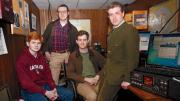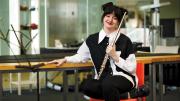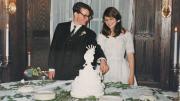These honors, awarded at the HAA board of directors’ winter meeting in February, celebrate both alumni and groups that have organized exceptional programs.
Larry Kahn ’83, of Orlando. An active member of the Harvard Club of Central Florida for more than 20 years, Kahn stepped up as president to revitalize the club, which is now thriving with new members, monthly events, and a healthy budget. In addition, he co-chairs and has expanded the Early College Awareness Program, and promotes its worth among other club leaders. Kahn is also an HAA Board member, having served as co-chair of the Alumni Leadership Conference and two terms as director for Eastern Florida and the Islands.
Walter L. Keats ’67, of Chicago. Keats joined the Harvard Club of Chicago (HCC) right after graduation and has since served as the administrative backbone of the organization. For the past three decades, he has overseen the induction of newly elected club presidents, officers, and directors. And as an unofficial club historian, he collected archival material for a 198-page book published for its 150th anniversary.
Acey Welch ’53, of Concord, Massachusetts. For more than two decades, Welch worked with classmates, and then with a cohort of other Radcliffe alumnae, to found and lead the Committee for the Equality of Women at Harvard (CEWH), a group dedicated to increasing the number of tenured women faculty. In 2013, she envisioned and created the Alumnae/Alumni Network for Harvard Women (ANHW), an intergenerational SIG that now has chapters in Boston, New York, and Washington, D.C. Welch and ANHW also played an integral role in developing Harvard’s inaugural Women’s Weekend last fall.
The Harvard Club of Australia, founded in 1961, has long fostered a strong relationship with the University. Its scholarship programs fund nine postgraduate students at Harvard schools and programs each year, and its Australia-Harvard Fellowship reinforces existing academic networks at mid-career and senior levels. The club also offers social, intellectual, and cultural events for alumni, as well as a mentoring program. As a result of such efforts, club membership has more than doubled to 500 within the last seven years.
Approaching its 125th anniversary, the Harvard Club of Seattle has also successfully increased membership to about 500 alumni, and doubled the number of club events to 45 per year. Public-service activities have been expanded, and now include participation in the Early College Awareness program and a public-service internship program for College students during January term (as well as a career-focused mentoring program).
Established during the 2011-2012 academic year, the First Generation Harvard Alumni (FGHA) aims to improve the experience of students who are the first generation of their families to attend a four-year American university. FGHA has drawn about 400 members, as well as an active board of more than 30 people. It has also developed a groundbreaking mentoring program, on- and off-campus events for students and alumni, and worked with Harvard’s Office of Career Services to organize career panels. The SIG has also supported undergraduates in establishing the First Generation Student Union.








